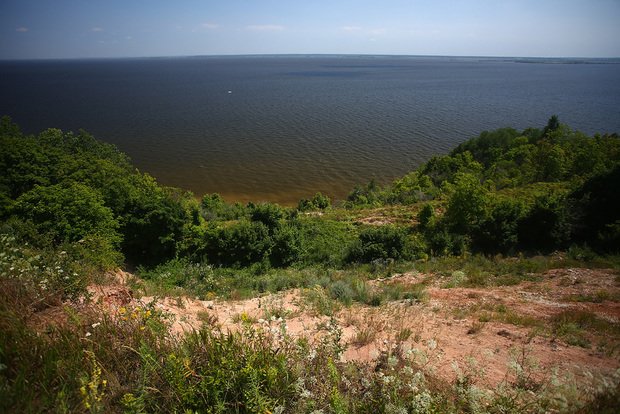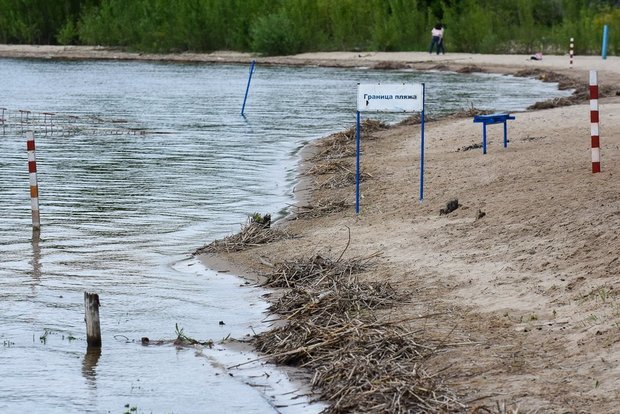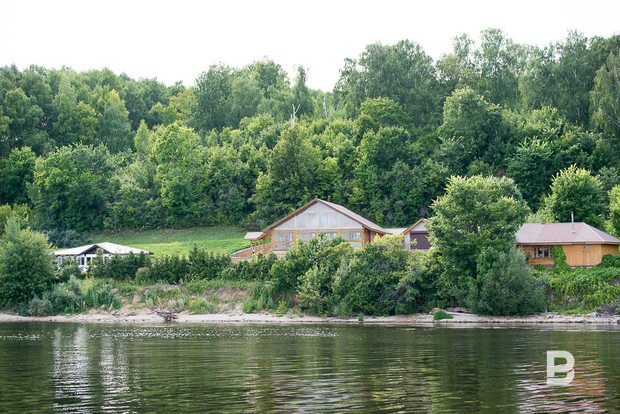Sergey Saksonov: ''Volga River today is a gutter''
The head of the Institute of Ecology of the Volga Basin at the RAS about the consequences of an ecological disaster occurring before our eyes
Low quality of water, massive fish pestilence, growth of poisonous algae and growth of diseases of the population related to environmental state — it is a set of consequences of the crisis of the system of Volga reservoirs. The situation is especially difficult in the Kuibyshev Reservoir located (if we can say so about water) in Tatarstan. Acting Director of the Institute of Ecology of the Volga Basin at the RAS Sergey Saksonov told about these and other issues in the interview with Realnoe Vremya.
''Hectares of land go under water''
The scandal surrounding the filling of the water area of the Volga River in Tatarstan resounded around the country in 2014: artificial islands were build under cottage settlements. What damage did such projects cause the Volga River as a result? How often does this happen?
The thing is that the Volga River is a federal object. Fortunately or not. The river and reservoirs have a large water protection zone. But it is everywhere and regularly violated. Because for rich people there are no environmental or other laws. I know that in Samara huge areas are built up to the water's edge. The same story is in Tatarstan. We received calls from Nizhny Novgorod — the same.
The thing is that our city protection legislation is made so that it is easy to commit a violation, pay a small fine and be happy with everything. If you remember, until 2000 Russia had the State Committee for Ecology, it was headed by academician Viktor Danilov-Danilyan, and environmental laws were much stricter then. But what happened? The change of power in Russia, reforms, not all of which benefited. Our current President was to boost the economy, which at that time was very weak. And, as economists say, it can only be boosted by easing the exploitation of natural resources — there is no other way, unfortunately. In terms of preserving the environment, these concessions have been fixed in our legislation: the law on nature protection was rewritten and amendments were made.
That time has passed. Now we already clearly understand that, taking away resources from nature and not giving anything in return, we lose more than we gain. In this regard, Kazan, Samara and the nearest cities and regions are all in the same team.

''Taking away resources from nature and not giving anything in return, we lose more than we gain. In this regard, Kazan, Samara and the nearest cities and regions are all in the same team.'' Photo: Roman Khasaev
What have we lost in relation to the Kuibyshev Reservoir?
The Kuibyshev Reservoir is the most problematic. Although citizens of Nizhny Novgorod would say that the most problematic is their Gorky Reservoir. Volgograd residents would say the same about their reservoir. In any case, we see a pre-crisis situation, and it has become much more acute in recent years due to global climate change. The year 2018, meteorologists say, is very similar to the year 2010. There are global changes in the atmosphere. The weather is changing, and this is one of the most important factors that determines the state of water ecological systems. Plus, increasing anthropogenic impact. Industry works, discharges into the reservoir increase. In the forest-steppe zone and in the more southern regions there is a very high degree of agricultural load, we are faced with the task of ensuring import substitution and food security. There is plowing of land, mineral and other fertilizers are poured on the fields, they are washed off, and all this falls into the Volga water. Plus utilities sector, sewerage — it's just a headache.
Therefore, it is no wonder they say that the Volga today is a gutter. I hate to say it about our river, but it's true.
What kind of problems does that lead to?
To restructuring of environmental systems. Imagine, the Volga was once a river, it is flowing water, it is one rhythm. Then it was blocked by dams, reservoirs were built. There were no such reservoirs in nature, and all this newly created ecosystem is beginning to rebuild, adapt to new conditions. The new ecosystem is emerging and continues to receive substances that are not peculiar to it. I'm talking about industrial and household discharges and washouts from the fields. There is a processing of waterfronts, you know that in Tatarstan waterfronts float and collapse. Not only in your region. The same occurs in Ulyanovsk Oblast and Samara Oblast. Hectares of land go under water.
Where does all this go? On the bottom of the reservoir. Bottom sediments are formed, in which a huge broth of sometimes unknown elements is absorbed. Our specialists even published in their time the work Bottom Sediments of the Kuibyshev Reservoir. The thickness of these layers is up to 10 metres. For a while, the bottom sediments were for good, they bound and absorbed pollutants. But now our experts say that the bottom sediments were saturated like a sponge with water. When you push it, all the dirt flows back. That's very bad and dangerous. And the spills of the Volga water become an explosive mixture, not quite favourable for the environment.
What does that indicate?
There are environmental indicators. The first is human health. Let's take medical statistics and see that the number of diseases associated with the influence of air and water on human skin — allergies and so on, increases. As well as many other diseases.

The second indicator is fish. Doctor of Biology Alexander Mineev studies fry during spawning and their further development. Usually in ponds about 5% of the fry have some deformities, abnormalities (aberrations). Today, in the Kuibyshev Reservoir, these aberrations are much higher than the norm — up to 15-20%. Fry do not have a mouth, do not have fins, respectively, they do not live to puberty. Usually, young fish respond clearly to the quality of water — they die. From this point of view, our fish stock is being undermined. And during the spawning there is a fluctuation in the water level: the level drops suddenly, and all the fish roe remain in small puddles, gullies that dry up, and we again remain without fish.
''In the process of decomposition, algae form poisons and toxins''
What can you say about the quality of drinking water in the Volga cities?
Water intake for drinking needs is made in two ways: it is to a lesser extent artesian groundwater and mainly reservoirs. I trust water utilities. Naturally, water passes several stages of treatment, bacterial one, and also on a number of chemical elements. But the thing is that those substances that fall into the Volga are taken by the same methods as 10-15-20 years ago. That is, the GOST standards don't change. However, I have suspicions that now there are other compounds in the water, with chemical elements that are not captured and not purified by these methods. It is not the water utilities to blame, but those who normalize water quality. These norms are now working for the whole country — from Vladivostok to Vyatka. It shouldn't. Because there are regional features, and even in the same Volga River the water in the upper is one, in the middle reaches — other, in the lower — the third.
That is, there should be regional maximum permissible concentration. And all our policies — water protection or water quality — should have a regional maximum permissible concentration. This will solve a number of organizational problems — for what to punish plants and so on.
What about blooming of water in the reservoirs?
It is called eutrophication of the reservoir, the mass development of blue-green algae. There are two reasons for this. The first is the enrichment of water with organic substances, from which it is difficult to treat. Mostly soaps, foaming and detergency. They contain a lot of phosphates, and some aquatic organisms like them very much, so eventually there is an outbreak of growth of these species. The second factor is the increase in water temperature: as soon as it exceeds 22 degrees, and this will happen literally in the near future, these organisms begin to multiply so massively that they become a threat.
Why are they bad? Because they absorb oxygen in the water. For all hydrobiont, that is, aquatic organisms, without oxygen life is impossible. Due to oxygen starvation, mass fish mortality occurs.
Moreover, when a small life cycle of these algae ends, they form various types of poisons and toxins in the process of decomposition. Since the biological mass of these organisms is huge, such an impact on the pond becomes significant. Everything says that this is a problem generated by human being. The nature didn't know it before.
Among the blue-green algae, there are such algae that live in local conditions, and there are many alien species that appear as a result of migration. It all resents the ecosystem, presses, transforms it, and for all natural inhabitants, among which human being is, it becomes unbearably hard.
Is it possible for Russia to consume water in a closed cycle, when it is taken, used, then treated and used again without returning to the reservoir?
There are no such almost anywhere so far. Some advanced environmental car washes practice this, but this is an exception to the rule. But life will make us do it. That's what developed countries do. This is more expensive, and provided that we have an expensive life, it is, unfortunately, our future. If it, this future, will be. I'm not afraid, but there are questions to this.

''All our policy – on water protection or water quality — should have a regional aspect. This will solve a number of organizational problems — for what to punish the plants and so on.'' Photo: Maksim Platonov
''The research fleet on the Volga is practically absent''
How has the flow of the Volga River changed?
There are calculations: before the construction of reservoirs, the distance from Valdai to Astrakhan water took a month, now it stretches for years. In the river mode, nature has a function of self-purification, and all the problems flow down into the Caspian Sea. But with stagnant water, these problems remain with us and we have to solve them.
It is difficult to say what these problems will be. Because we know very little about the life of the Volga.
Why?
We have one vessel, it's called Biologist. Eight seats. The ship is old and cramped, it was presented by Ivan Papanin (Soviet geographer, Arctic Explorer – editor's note). The water area of the Kuibyshev Reservoir is one of the largest in Europe. Every time to order an expedition, you need to prove that it is necessary. That is, the research fleet on the Volga is practically absent. The nearest institute, which is engaged in the Volga, is located in the Yaroslavl Oblast, is the Institute of Biology of Internal Waters, they may have a little more ships there. But the Volga is stretched for 4,000 kilometres, of course, all of our opportunities today are ridiculous. Our data we collect with difficulty is interpreted for the whole Volga River basin is likely inaccurate. But even what we get is very disturbing.
A lot of things that we observe and do today have no alternative. That is, we have no experience, we have not accumulated it. These problems arise faster than we study them and form some ideas about them. Here like in a war — there must be an instant reaction. There are not enough specialists in the field of rivers, ecology in the broad sense of the word.

''The Volga starts with beaches, springs, forests, environmental awareness, with education. A whole complex of problems of normal life of the state.'' Photo: Maksim Platonov
''Tatarstan will become the first region in the Volga water area, where large-scale work will be conducted on renovation of treatment facilities to reduce the volume of wastewater pollution by at least 60% by 2025. To solve the problem, the region will allocate 15,7 billion rubles, most of which will go to the renovation of treatment facilities.'' How would you comment on this?
I follow the environmental legislation of the Republic of Tatarstan. You do a lot of useful and good. Hydrobiologists and ecologists of Kazan University are doing well. In the neighbouring regions, many issues are worked out worse.
Last time I was in Kazan in February at a meeting of the State Duma in the city hall (the round table meeting of the State Duma Committee on ecology and environmental protection on the topic ''On the implementation of measures aimed at the conservation and prevention of pollution of the Volga river'' – editor's note), these issues were just discussed. The programme, as you know, started last year, its initiator was Vladimir Putin, in the message he listed the national symbols of Russia — the Volga River, Lake Teletskoye, Baikal, and said that they need to be specially protected. It was established a priority project for the conservation of the Volga River at more than 200 billion rubles. The republic was allocated relatively little money, and Kazan discussed the importance of spending every ruble where it was needed. In Russia, after all, as you know, money often does not reach the point for which they were intended.
In this priority project, each entity offers its own scheme of how to spend the money for the benefit of the Volga basin. Tatarstan offered a very competent project, I especially liked that the experts understood the Volga in a broad sense: not only as the water flowing, but also as banks, river tributaries and forest. Some people think that if you improve the sewerage system, the terrible drains will not fall into the river, and everything will be ok. Certainly, all cleaning systems must be of high quality. But that doesn't solve the problem. The Volga starts with beaches, springs, forests, environmental awareness, with education. A whole complex of problems of normal life of the state. This is all the task of the state, we pay taxes on this. We have the right to a healthy environment by the Constitution. The leaders of the country, do these things! The consequences are very sad. We, as the population, do not grow, we are decreasing, diseases that are associated with the environment and nutrition are increasing. Sad statistics.